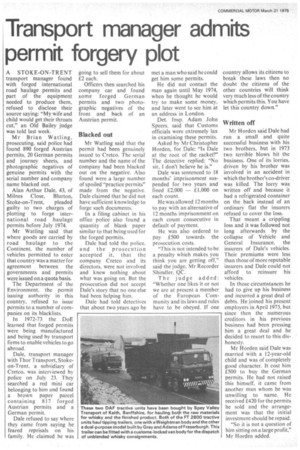Transport manager admits permit forgery plot
Page 32

If you've noticed an error in this article please click here to report it so we can fix it.
A STOKE-ON-TRENT transport manager found with forged international road haulage permits and part ,af the equipment needed to produce them, refused to disclose their source saying: "My wife and child would get their throats cut," an Old Bailey judge was told last week.
Mr Brian Watling, prosecuting, said police had found 890 forged Austrian permits, 20 German permits and journey sheets, and photographic negatives of genuine permits with the serial number and company name blacked out.
Alan Arthur Date, 43, of Milnes Close, BIurton, Stoke-on-Trent, pleaded guilty to two charges of plotting to forge international road haulage permits before July 1974.
Mr Watling said that where goods are carried by road haulage to the Continent, the number of vehicles permitted to enter that country was a matter for agreement between the governments and permits were issued on a quota basis.
The Department of the Environment, the permit issuing authority in this country, refused to issue permits to a number of companies on its blacklists.
In 1972-73 the DoE learned that forged permits were being manufactured and being used by transport firms to enable vehicles to go abroad.
Dale, transport manager with Thor Transport, Stokeon-Trent, a subsidiary of Cretco, was interviewed by police on July 21 They searched a red mini car belonging to him and found a brown paper parcel containing 817 forged Austrian permits and a German permit.
Dale refused to say where they came from saying he feared reprisals on his family. He claimed he was going to sell them for about £2 each.
Officers then searched his company car and found some forged German permits and two photographic negatives of the front and back of an Austrian permit.
Blacked out
Mr Watling said that the permit had been genuinely issued to Cretco. The serial number and the name of the company had been blacked out on the negative. Also found were a large number of spoiled "practice permits" made from the negative. Dale claimed that he did not have sufficient knowledge to forge such documents.
In a filing cabinet in his office police also found a quantity of blank paper similar to that being used for the forged permits.
Dale had told the police, and the prosecution accepted it, that the company Cretco and its directors, were not involved and knew nothing about what was going on. But the prosecution did not accept Dale's story that no one else had been helping him.
Dale had told detectives that about two years ago he met a man who said he could get him some permits.
He did not contact the man again until May 1974, when he thought he would try to make some money, and later went to see him at an address in London.
Det. Insp. Adam John Speers, said that Customs officials were extremely lax in examining these permits.
Asked by Mr Christopher Harden, for Dale: "Is Dale at the root of the racket?" The detective replied: "No sir, I don't believe he is."
Dale was sentenced to 18 months' imprisonment suspended for two years and fined £2,000 — £1,000 on each count.
He was allowed 12 months to pay with an alternative of 12 months imprisonment on each count consecutive in default of payment.
He was also ordered to pay £500 towards the prosecution costs.
"This is not intended to be a penalty which makes you think you are getting off," said the judge, Mr Recorder Shindler, QC.
The judge added: "Whether one likes it or not we are at present a member of the European Community and its laws and rules have to be obeyed. If one country allows its citizens to break these laws then no doubt the citizens of the other countries will think very much less of the country which permits this. You have let this country down."
Written off
Mr Harden said Dale had run a small and quite successful business with his two brothers, but in 1973 two terrible blows hit the business. One of its lorries, driven by his brother was involved in an accident in which the brother's co-driver was killed. The lorry was written off and because it had a refrigerated container on the back instead of an ordinary flat the insurers refused to cover the loss.
That meant a crippling toss and it was followed not long afterwards by the collapse of Vehicle and General Insurance, the insurers of Dale's vehicles. Their premiums were less than those of more reputable insurers and Dale could not afford to reinsure his vehicles.
In those circumstances he had to give up his business and incurred a great deal of debts. He joined his present employers in April 1973, but since then the numerous creditors in his previous business had been pressing him a great deal and he decided to resort to this dishonesty.
Mr Horden said Dale was married with a 12-year-old child and was of completely good character. It cost him £500 to buy the German permits. He had not raised this himself, it came from another man whom he was unwilling to name. He received £420 for the permits he sold and the arrangement was that the initial investment should be repaid.
"So it is not a question of him sitting on a large profit," Mr Horden added.








































































































































